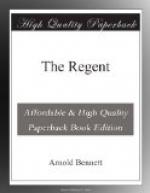“Maud,” she said with divine calm to the maid who bore in the baked York ham under its silver canopy, “you haven’t taken away that brush that’s in the passage.”
(Another illustration of Nellie’s inability to live up to six thousand pounds a year; she would always refer to the hall as the “passage!”)
“Please’m, I did, m’m,” replied Maud, now as conscious of perfection as her mistress. “He must have took it back again.”
“Who’s ‘he?’” demanded the master.
“Carlo, sir.” Upon which triumph Maud retired.
Edward Henry was dashed. Nevertheless, he quickly recovered his presence of mind and sought about for a justification of his previous verdict upon the negligence of five women.
“It would have been easy enough to put the brush where the dog couldn’t get at it,” he said. But he said this strictly to himself. He could not say it aloud. Nor could he say aloud the words “neuralgia,” “three hundred and forty-one pounds,” any more than he could say “late.”
That he was in a peculiar mental condition is proved by the fact that he did not remark the absence of his mother until he was putting her share of baked ham on to a plate.
He thought: “This is a bit thick, this is!” meaning the extreme lateness of his mother for the meal. But his only audible remark was a somewhat impatient banging down of the hot plate in front of his mother’s empty chair.
In answer to this banging Nellie quietly began:
“Your mother—”
(He knew instantly, then, that Nellie was disturbed about something or other. Mother-in-law and daughter-in-law lived together under one roof in perfect amity. Nay, more, they often formed powerful and unscrupulous leagues against him. But whenever Nellie was disturbed, by no matter what, she would say “your mother” instead of merely “mother!” It was an extraordinary subtle, silly and effective way of putting him in the wrong.)
“Your mother is staying upstairs with Robert.”
Robert was the eldest child, aged eight.
“Oh!” breathed Edward Henry. He might have inquired what the nurse was for; he might have inquired how his mother meant to get her tea. But he refrained, adding simply, “What’s up now?”
And in retort to his wife’s “your,” he laid a faint emphasis on the word “now,” to imply that those women were always inventing some fresh imaginary woe for the children.
“Carlo’s bitten him—in the calf,” said Nellie, tightening her lips.
This, at any rate, was not imaginary.
“The kid was teasing him as usual, I suppose?” he suggested.
“That I don’t know,” said Nellie. “But I know we must get rid of that dog.”
“Serious?”
“Of course we must,” Nellie insisted, with an inadvertent heat, which she immediately cooled.
“I mean the bite.”
“Well—it’s a bite right enough.”
“And you’re thinking of hydrophobia, death amid horrible agony, and so on.”




